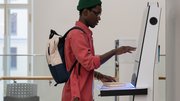News
Industries see potential of RFID tech
August 11, 2003
MIAMI -- Here is an experience that an average consumer might like to have at a local video store on a busy Friday night: They grab a DVD and pass by a self-service kiosk by the exit. A message flashes on the screen: "Welcome Joe Consumer. The rental for this movie is x amount for two nights and will be charged to your Visa card. Press `1' if you want a receipt.' All without ever opening a purse or wallet.
According to a report in the Miami Herald,this type of quick, convenient transaction could become common in three to five years thanks to a rapidly emerging technology called Radio Frequency Identification, or RFID.
RFID has been around for years; it's already used in the transponders that automatically pay tolls on some highways and in subway cash cards in Singapore and Hong Kong. See related stories, "American Express tests contactless payment systems," "Delta Air to test baggage-tracking technology in the fall," "Day two at NRF focuses on RFID."
But a new generation of low-cost RFID tags, combined with the Internet's power to instantly move data around the world, is opening up huge new opportunities -- and prompting some Silicon Valley entrepreneurs and investors to tout RFID as a candidate for The Next Big Thing, the report said.
'It's an avalanche. This threatens to hype itself out of control," said Geoffrey Baehr, a partner in U.S. Venture Partners of Menlo Park, Calif., as he moderated a panel discussion recently on RFID at Stanford University's Graduate School of Business.
The panel drew a near sell-out crowd of 265, many of them venture capitalists and other investors looking for deals. Baehr estimated 30 to 40 companies in Silicon Valley are now working on some aspect of RFID.
Helping to crank up the intensity level at the gathering, sponsored by the MIT/Stanford Venture Lab, was a recent string of important endorsements for RFID.
The biggest news came on June 11 when Wal-Mart Stores, the nation's largest retailer, ordered its 100 top suppliers to begin using RFID tags on shipments beginning in January 2005, the report said.
Among the other RFID headlines:
- In January, Gillette ordered 500 million low-cost RFID tags from Alien Technology of Morgan Hill, Calif., the first giant order for RFID from a major manufacturer of consumer goods.
- In May, Visa and Philips Electronics announced a partnership to develop RFID credit cards.
- In June, Microsoft joined the Auto-ID Center at the Massachusetts Institute of Technology, the major research organization developing RFID technology, and Delta Air Lines said it will test RFID luggage tags in Jacksonville, Fla.
Most of these companies are looking at simple RFID tags that can respond from a distance of five to 10 feet. Fancier tags that include batteries to boost transmission power can have much greater range.
RFID makes it possible to collect information automatically and quickly in ways that would never be possible with bar-code scanners.
Wal-Mart and other retailers are hoping RFID will help them keep better track of inventory, at first in warehouses and eventually on store shelves, to make it less likely they'll be out of stock on products their customers want.
The biggest obstacle until now has been cost. The least-expensive RFID tags cost about 50 cents today, but that should drop to five cents next year and under one cent a few years later.
Readers, too, are getting cheaper. They now cost $500 or more, but could soon be built into such electronic devices as mobile phones for as little as $10 in added cost, the report said.










